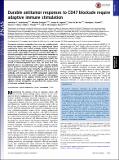Durable antitumor responses to CD47 blockade require adaptive immune stimulation
Author(s)
Sockolosky, Jonathan T.; Ho, Chia Chi M.; Almo, Steven C.; Garcia, K. Christopher; Dougan, Michael; Kauke, Monique Jacqueline; Ploegh, Hidde; Ingram, Jessica R.; ... Show more Show less
DownloadSockolosky-2016-Durable antitumor re.pdf (1.132Mb)
PUBLISHER_POLICY
Publisher Policy
Article is made available in accordance with the publisher's policy and may be subject to US copyright law. Please refer to the publisher's site for terms of use.
Terms of use
Metadata
Show full item recordAbstract
Therapeutic antitumor antibodies treat cancer by mobilizing both innate and adaptive immunity. CD47 is an antiphagocytic ligand exploited by tumor cells to blunt antibody effector functions by transmitting an inhibitory signal through its receptor signal regulatory protein alpha (SIRPα). Interference with the CD47–SIRPα interaction synergizes with tumor-specific monoclonal antibodies to eliminate human tumor xenografts by enhancing macrophage-mediated antibody-dependent cellular phagocytosis (ADCP), but synergy between CD47 blockade and ADCP has yet to be demonstrated in immunocompetent hosts. Here, we show that CD47 blockade alone or in combination with a tumor-specific antibody fails to generate antitumor immunity against syngeneic B16F10 tumors in mice. Durable tumor immunity required programmed death-ligand 1 (PD-L1) blockade in combination with an antitumor antibody, with incorporation of CD47 antagonism substantially improving response rates. Our results highlight an underappreciated contribution of the adaptive immune system to anti-CD47 adjuvant therapy and suggest that targeting both innate and adaptive immune checkpoints can potentiate the vaccinal effect of antitumor antibody therapy.
Date issued
2016-04Department
Massachusetts Institute of Technology. Department of Biology; Massachusetts Institute of Technology. Department of Chemical Engineering; Whitehead Institute for Biomedical Research; Koch Institute for Integrative Cancer Research at MITJournal
Proceedings of the National Academy of Sciences
Publisher
National Academy of Sciences (U.S.)
Citation
Sockolosky, Jonathan T. et al. “Durable Antitumor Responses to CD47 Blockade Require Adaptive Immune Stimulation.” Proceedings of the National Academy of Sciences 113.19 (2016): E2646–E2654. © 2016 National Academy of Sciences
Version: Final published version
ISSN
0027-8424
1091-6490